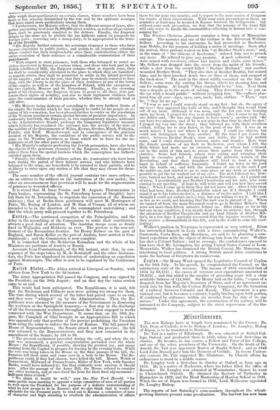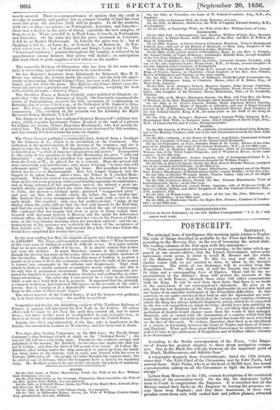311isrt1lautnno.
The new Bishops have at length been nominated by the Crown : Dr. Tait, Dean of Carlisle, is to be Bishop of London ; Dr. Longley, Bishop of Ripon, is to be translated to Durham. Dr. Tait is a native of Edinburgh. He was educated at Balliol Col- lege, Oxford, and graduated there in 1833, when he took first-class in classics. He became, in due course, a Fellow and Tutor of his College, and one of the select preachers of the University. On the death of Dr. Arnold, Dr. Tait was appointed Master of Rugby School ; and in 1849 Lord John Russell gave him the Deanery of Carlisle. In recent Univer- sity contests Dr. Tait supported Mr. Gladstone. In Church affairs he endeavours to tread in a middle course.
Dr. Longley took a first-class in classics at Oxford so long ago as 1615. He is a native of Rochester, where his father filled the office of Recorder. Dr. Longley was educated at Westminster ; thence he went to Christchurch Oxford. He obtained the Rectory of Tytherloy in Hampshire in 1829, and the Head Mastership of Harrow School in 1831. When the see of Ripon was formed in 1836, Lord Melbourne appointed Dr. Longley Bishop.
The reports of last Saturdays corn-markets throughout the wheat- growing districts present some peculiarities. The harvest has now been
nearly secured. There is a preponderance of opinion that the yield is average in quantity and-quality.; but as a larger breadth of land has been sown this year, the absolute yield will be greater. In all the markets, with two or three exceptions—as Nottingham, Leicester, and Lincoln— there was a decline in the price of wheat, especially the new samples, of from 6s. to 28. While corn fell 3s. in Mark Lane, it rose 38. in Nottingham and Leicester. On the same day that the price increased at Leicester, it fell 6s. at Market Harborough. In Lincoln the price rose 2,8.; but at Spalding it fell 58., at Lynn 48., at Newark 38., at Boston 2.s. At Nor- wich wheat rose 38. ; but at Yarmouth and King's Lynn it fell 48. The " downward tendency," general throughout the country, is referred to an apprehension among farmers that prices will decline ; an anticipation that leads them to push supplies of new wheat on the market.
The venerable Duchess of Gloucester, who has been ill for some weeks past, is recovering, and is expected soon to be convalescent.
On her Majesty's departure from Edinburgh for Balmoral, Mrs. H. B. Stowe was among the persons inside the station ; and she took the oppor- tunity of presenting, through Colonel Grey, her new work Dred, in two vo- lumes, just hot from the press. Her Majesty and Prince Albert came for- ward and gave her a gracious and friendly recognition, accepting the book with evident pleasure.—Country Paper.
The .Yorthern Times, a Roman Catholic paper publised in Glasgow, re- ports that " the Duchess Dowager of Argyll, who has lately renounced the errors of Protestantism, received the holy sacrament of confirmation on Saturday last at seven o'clock a.m.' at the Cathedral of St. Andrew's, Glas- gow. Her Grace subsequently heard mass, and participated in the holy communion. The celebrant on the occasion was his Lordship the Right Reverend Bishop Murdoch, V.A.E.D."
The Emperor of Russia has confirmed General Mouravieff's military sen- tence, which degrades Lieutenant Prince Zerekeli to the rank of a private for killing an ensign, Prince Bagration Muchranski, who had grossly in- sulted him. The possibility of promotion is not destroyed by this sentence, and Lieutenant Zerekeli retains his princely dignity.
The Court .Tournal publishes a wonderful story, derived from a brochure by the Princess de S., which is in circulation on the Continent. The authoress is the mother-hi-law of the heroine of the romance, and she is about to take the black veil. Her daughter-in-law, the Princess Eleanore, is described as "a child of immense imagination and power." Transported to the castle of her guardian in the Hartz Mountains, she grew " wild and intractable " • and when her guardian was appointed Ambassador to Paris from the Court of W., he placed her in a convent. Here she proved still more intractable and mischievous ; and, weary of trying "to tame this wild vehement spirit," the superior sent her home. Her guardian next trans- ferred her to — at Hammersmith. Here her temper changed, and she begged to be taken home. After a time, the Prince de S. reached Ham- mersmith. When his arrival was announced, she was found " on her knees alone in her own room praying, with a most fearful expression of countenance; and on being informed of her guardian's arrival, she uttered a most un- earthly shriek, and rushed down the stairs like one possessed." Returning to Paris, she showed a subdued spirit ; practised "exaggerated piety " ; and gave out that she should surely die before she was twenty-one. She insisted that every arrangement should be made with a view to this early death. She married ; and, says her mother-in-law, " judge of my dismay when she coolly told me that she had sold herself to the Evil One and that she would be claimed before she reached the age of twenty-one She confessed that her despair had been so great at being exiled, that, wearied with incessant prayers to Heaven and the saints for deliverance without effect, she had at length addressed her vows to the Powers of Dark- ness, on the very Sunday morning when her guardian arrived ; and the an- nouncement of his presence was evidently the token of the acceptance of that fearful vow." She died, full-dressed for a ball, two days before she would have completed her twenty-first year.
In the year ending last May the imports of specie into Calcutta amounted to 5,810,1500/. The Times correspondent remarks on this—" What becomes of this vast mass of bullion it would be difficult to say. It is quite certain that we do not export a fifth of it by sea. It is almost certain that it does not cross the frontier. It must, therefore, remain in the country ; but though the process has gone on for years, there is no perceptible increase of the circulation. Many officials, to whom this mass of bullion is as great a puzzle as it seems to be to the economist, believe that the bulk of the money is turned into ornaments by the artisans and shopkeepers. That class which in India is wholly untaxed accumulates money rapidly, and this is its only idea of permanent investment. The quantity of ornaments pos- sessed by families of weavers, oil-dealers, braziers, and goldsmiths, is some- times astonishing. The other day I was present in a court in the interior while a suit on a bond debt was in progress. It appeared that the plaintiff, a.cornmon workman, had borrowed 600 rupees on the security of his wife's jewels : that is exactly as if a Spitalfields' weaver possessed watches and rings to the value of three years' wages."
The wheat harvest of the United States, if not the largest ever gathered in, is at least above an average : the quality is excellent.
Carpentier and Grelet, the defaulting cashiers of the Northern Railway of France, it appears left Liverpool for New York in the Fulton. Of course efforts will be made to get back the spoil they carried off, and to arrest them ; but these results must be accomplished in some irregular way, as there is no treaty of extradition between France and the United States.
Luerin, late chief superintendent of the line, who is implicated in the frauds, was arrested in London on Wednesday, and has been sent to Paris.
Two days after leaving Valparaiso, on the 28th June, the Pacific Steam Company's ship Santiago struck at night on the "Infernal Rocks" ; she was got off, but in a very leaky state. Thanks to the coolness, energy, and judgment of the master, Mr. Bartlett, in two days and nights the slup was got to Callao ; and thus the lives of 150 people were saved. At Callao, Mr. Bartlett, after diving under the ship, managed to patch up from the inside ten large holes in the bottom, took in coals, and started with his crew to Taboga, 1500 miles off: the people of Callao thought the captain mad ; but he arrived safe at Taboga, where the Company have a factory for repairing ships. Mr. Bartlett seems to be one of the energetic old school of mariners.



























 Previous page
Previous page